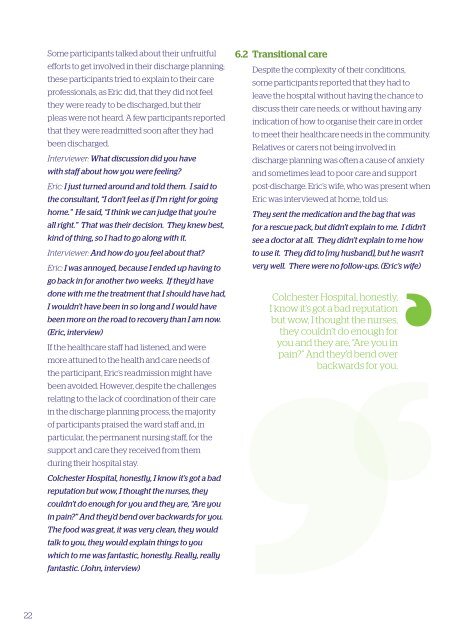Hospital Discharge
3Jzx309Yruj
3Jzx309Yruj
Create successful ePaper yourself
Turn your PDF publications into a flip-book with our unique Google optimized e-Paper software.
Some participants talked about their unfruitful<br />
efforts to get involved in their discharge planning;<br />
these participants tried to explain to their care<br />
professionals, as Eric did, that they did not feel<br />
they were ready to be discharged, but their<br />
pleas were not heard. A few participants reported<br />
that they were readmitted soon after they had<br />
been discharged.<br />
Interviewer: What discussion did you have<br />
with staff about how you were feeling?<br />
Eric: I just turned around and told them. I said to<br />
the consultant, “I don’t feel as if I’m right for going<br />
home.” He said, “I think we can judge that you’re<br />
all right.” That was their decision. They knew best,<br />
kind of thing, so I had to go along with it.<br />
Interviewer: And how do you feel about that?<br />
Eric: I was annoyed, because I ended up having to<br />
go back in for another two weeks. If they’d have<br />
done with me the treatment that I should have had,<br />
I wouldn’t have been in so long and I would have<br />
been more on the road to recovery than I am now.<br />
(Eric, interview)<br />
If the healthcare staff had listened, and were<br />
more attuned to the health and care needs of<br />
the participant, Eric’s readmission might have<br />
been avoided. However, despite the challenges<br />
relating to the lack of coordination of their care<br />
in the discharge planning process, the majority<br />
of participants praised the ward staff and, in<br />
particular, the permanent nursing staff, for the<br />
support and care they received from them<br />
during their hospital stay.<br />
Colchester <strong>Hospital</strong>, honestly, I know it’s got a bad<br />
reputation but wow, I thought the nurses, they<br />
couldn’t do enough for you and they are, “Are you<br />
in pain?” And they’d bend over backwards for you.<br />
The food was great, it was very clean, they would<br />
talk to you, they would explain things to you<br />
which to me was fantastic, honestly. Really, really<br />
fantastic. (John, interview)<br />
6.2<br />
Transitional care<br />
Despite the complexity of their conditions,<br />
some participants reported that they had to<br />
leave the hospital without having the chance to<br />
discuss their care needs, or without having any<br />
indication of how to organise their care in order<br />
to meet their healthcare needs in the community.<br />
Relatives or carers not being involved in<br />
discharge planning was often a cause of anxiety<br />
and sometimes lead to poor care and support<br />
post-discharge. Eric’s wife, who was present when<br />
Eric was interviewed at home, told us:<br />
They sent the medication and the bag that was<br />
for a rescue pack, but didn’t explain to me. I didn’t<br />
see a doctor at all. They didn’t explain to me how<br />
to use it. They did to [my husband], but he wasn’t<br />
very well. There were no follow-ups. (Eric’s wife)<br />
Colchester <strong>Hospital</strong>, honestly,<br />
I know it’s got a bad reputation<br />
but wow, I thought the nurses,<br />
they couldn’t do enough for<br />
you and they are, “Are you in<br />
pain?” And they’d bend over<br />
backwards for you.<br />
22


